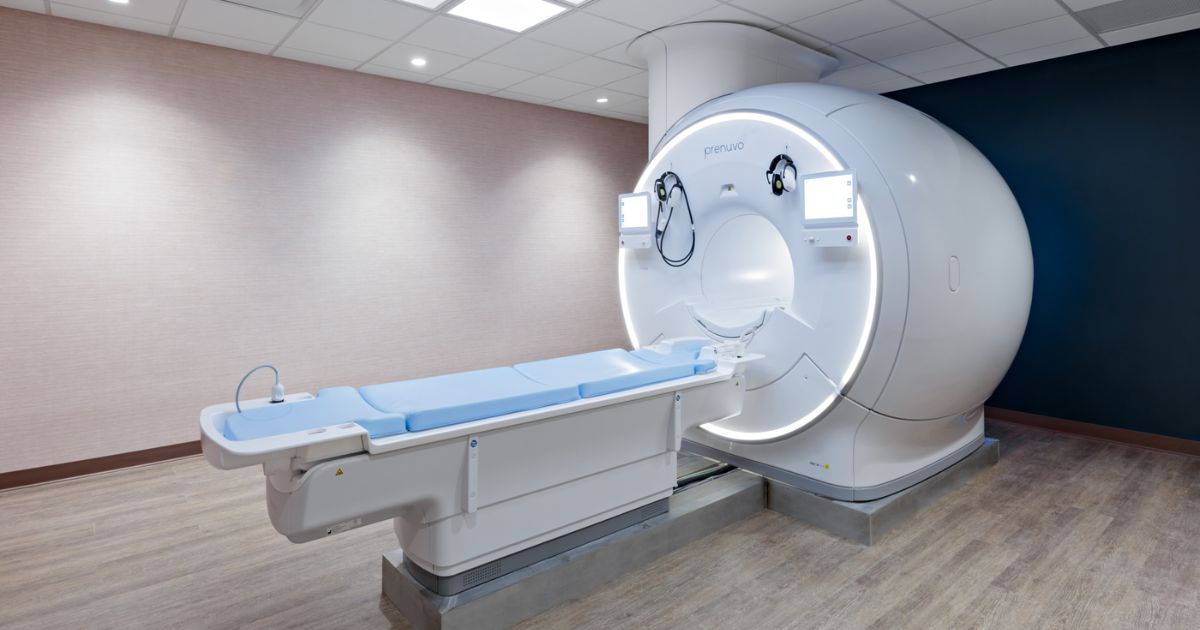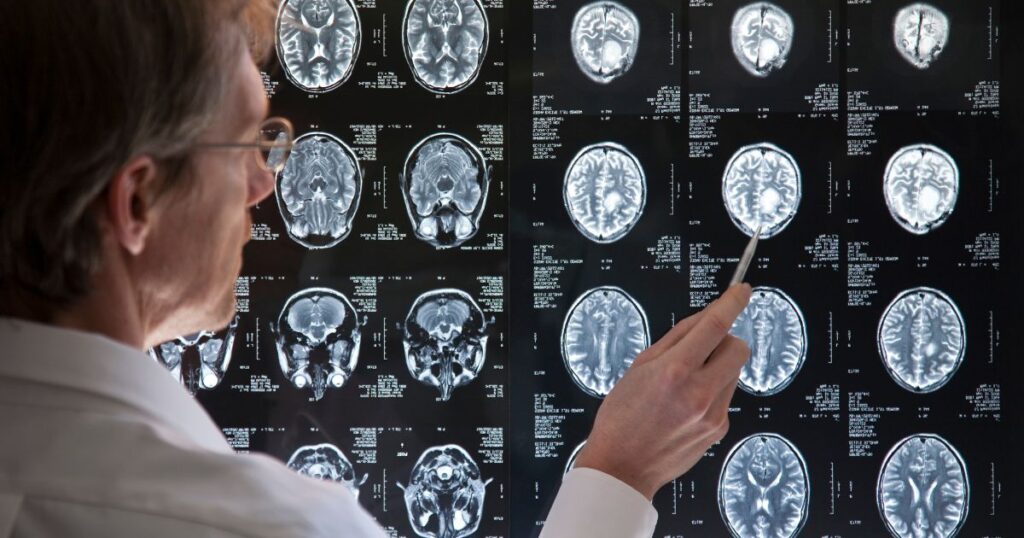Prenuvo Scans: Kim Kardashian’s Stunning Endorsement Ignites Controversy

Reed Berglund is a serial entrepreneur and tech startup investor…
Like many, my first introduction to Prenuvo Scans was through Kim Kardashian. A friend shared a link and asked if I was familiar with these full-body MRIs. One of the reasons we launched Breathe was to dig into such trends and meet the innovators behind them. As a natural skeptic who usually avoids health fads, I was intrigued.
According to McKinsey’s global wellness trends report this year, most Americans prioritize products and services for healthy aging and longevity. Having lost several family members to cancer, I felt a personal connection to this topic. We sat down with Andrew Lacy, Prenuvo’s founder, to gain perspective on this rising trend. For context, there were fewer than ten MRI scanners per million Americans in 1993, according to OECD data.
The Rise of Prenuvo Scans

A Brief History of Medical MRI
In 1983, Robert “Bob” Kagan, a pathologist, envisioned the potential of MRI technology, which was then experimental. Despite initial resistance, including a refusal from Holy Cross Hospital to invest $1.2 million in an MRI machine, Kagan garnered support from 40 doctors who each contributed $25,000. This initiative marked the early days of MRI, a now-ubiquitous technology. Today, the MRI industry in the U.S. sees nearly 40 million scans annually, generating close to $50 billion, with leading companies like General Electric and Siemens Healthineers dominating the market.
The Prenuvo Journey
Founded in 2018, Prenuvo has rapidly expanded, opening a clinic in New York City in 2023, backed by $70 million in Series A funding. Notable investors include Anne Wojcicki, Cindy Crawford, and Tony Fadell. Prenuvo’s rise is also driven by the personal experiences of its founder, Andrew Lacy.
Lacy, originally from Australia, moved to the US and started multiple ventures before founding Prenuvo. He described his journey during an interview, explaining how his health concerns in his mid-forties led him to seek comprehensive health insights. Lacy shared, “I never looked after myself very well, didn’t eat well, didn’t exercise well, didn’t sleep as much as I could have. I hit my mid-forties and just remember looking in the mirror once and saying, you know what, I’m doing this for a better future, but am I going to be around for that future that I’m trying to create?” This moment of self-reflection spurred him to undergo a whole-body scan, which he found transformative. Inspired by the detailed insights he gained from the scan, Lacy set out to make this technology accessible to more people. “It was the closest thing to Star Trek. I learned everything that was going on in every organ of my body,” Lacy said.
The stereotypes of tech founders overworking and sacrificing their own health are all too real. In a recent interview, I spoke with James Beshara of Magic Mind, who found himself in the hospital from drinking too much coffee. These personal experiences highlight the importance of proactive health management, which drives the mission behind Prenuvo.
The Controversy
Medical Community Skepticism of Prenuvo Scans
The debate around Prenuvo’s full-body MRI scans highlights a tension between the promise of early detection and the risks of unnecessary stress and procedures. While celebrity endorsements and technological advancements drive interest and accessibility, ongoing scrutiny from the medical community underscores the need for cautious and informed use of this emerging health trend.
Dr. Matthew Davenport of Michigan Medicine notes, “Knowing is not always to your advantage if what you learn doesn’t have a clear pathway.” He explains that incidental findings from routine scans can lead to unnecessary follow-ups and anxiety. Davenport estimates that 20% to 40% of MRI and CT scans reveal incidental findings, most of which are benign but cause uncertainty and stress.
Potential Psychological Impact
The fear is that identifying specific anatomical variations can cause unnecessary psychological stress. Patients might undergo further testing for findings that fall within the spectrum of normal. “Those incidental findings are 500 to one or 1,000 to one unimportant, but we end up doing stuff with them because we don’t know what to do,” says Davenport.
Andrew Lacy’s Perspective
Andrew Lacy acknowledges some of the medical community’s concerns but believes many do not apply to Prenuvo scans. He explains, “There’s a lot of misinformation around the space… The challenge with whole-body screening really is twofold.” He recalls the early days of inaccurate and high-dose CT scans used in shopping malls, which increased cancer risks. However, he argues that today’s MRI technology, combined with AI and advanced radiologist training, has significantly improved accuracy and safety.
Accuracy and the Use of AI

Andrew Lacy emphasizes the critical importance of accuracy in Prenuvo’s full-body MRI scans. He points out that the vast majority of MRI machines in use today are over 20 years old. The effectiveness of modern scans relies heavily on the combination of up-to-date hardware, advanced software, and highly trained radiologists, augmented by cutting-edge AI technology.
Lacy explains, “We optimize everything for accuracy. In the coming twelve months, we’ll publish internal clinical studies showing that the accuracy of these exams is as good as standard-of-care screening for some cancers.” He further elaborates on Prenuvo’s significant advantage in data collection, highlighting that their repository includes more comprehensive MRI image data than any other entity worldwide.
Lacy notes, “Building the model is one thing, but getting them through FDA approval can take time. What excites me most about AI is not just diagnostics but understanding subtle changes in the body’s physiology.” Prenuvo’s AI can identify tiny, yet significant changes in organs over time, providing valuable insights into how lifestyle or genetics might affect aging processes.
“We might look at you and say, your brain looks like someone who’s 30, but your liver is much older. This information helps manage your health better,” says Lacy. The use of voxels—tiny 3D cubes representing values on a grid—allows Prenuvo to visualize and analyze 3D data with high precision. As Lacy puts it, “We’re voxel visionaries,” using this advanced imaging to push the boundaries of preventive healthcare.
Employee Benefits and Proactive Health
Lacy discusses a broader trend towards holistic health, particularly among younger workers, driven by COVID-19’s impact on health awareness. Additionally, specific sectors like the VA, mining, and aviation, where occupational risks are higher, show significant interest in proactive health measures. Prenuvo’s work with firefighting unions and airline pilots exemplifies this targeted approach, addressing unique health risks in various professions.
Industry Impact
For high-risk sectors like firefighting, where exposure to toxic chemicals is a concern, Prenuvo’s scans provide crucial early health insights. Shaun Fix, President at Emergency Medical Consultants, highlights the benefits: “Introducing Prenuvo to our firefighters and paramedics in Boca Raton was a no-brainer for us… The upside is that you know what’s happening under the skin now, versus five years later.” This initiative is being rolled out to frontline workers, ensuring they have a baseline knowledge of their health.
The Role of Prenuvo Scans in Longevity
As interest in longevity and healthy aging grows, Prenuvo scans are playing an essential role in personalized health management programs. A notable partnership with Cenegenics highlights this trend. Cenegenics uses whole-body diagnostic data to create personalized Performance Health Age Management Programs for its patients, monitoring over 90 biomarkers to slow down the biological aging process.
Kristy Berry, CEO of Cenegenics, remarked, “Like Prenuvo, our goal is to give patients a comprehensive, holistic view of their health so that they can proactively manage their wellbeing. We look forward to bringing Prenuvo’s powerful imaging tools for early detection to our patients.”
Conclusion
On a personal note, I am inspired by the technological advances that Lacy highlights. This represents the exciting tension of a technical evolution with AI, which must be treated with respect. Innovators like Lacy are challenging the status quo, providing alternatives while navigating the complexities of government involvement and consumer protection. We invite you to share your personal stories, questions, and feedback as we continue to explore these trends and their impact on health and wellness.
Prenuvo’s full-body MRI scans offer comprehensive health insights and early detection of numerous conditions, leveraging AI to enhance accuracy. Despite these benefits, controversies remain about their cost-effectiveness and potential to cause anxiety from incidental findings. The scans mark a significant step forward in proactive healthcare.
Future Outlook
As part of our ongoing series on proactive healthcare, we will explore related trends such as Functional Medicine biomarker testing, hormone balancing, and regenerative medicine like stem cell therapy. In a follow-up to this interview, team members will undergo Prenuvo scans and share first-hand experiences and feedback.
Reed Berglund is a serial entrepreneur and tech startup investor with a passion for marketing technology, DTC space, and wellness. He is the CEO and co-founder of Breathe Media, a Miami-based media company focused on promoting wellness and mindfulness through hyper-local content. Berglund is a sought-after advisor and thought leader, having been featured in publications such as Kidscreen, Sramana Mitra, Cynopsis, and HuffPost.







